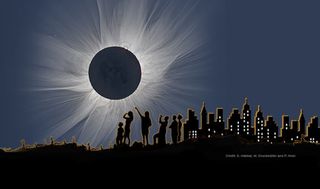Solar Eclipse 2017 Live: Here Are Video Streams and Webcasts to Watch

The eclipse is here! Updated Aug. 21 with final webcast details. You can watch all the major NASA webcasts on one page here.
Experience the 2017 total solar eclipse virtually: People who are outside the eclipse path, under cloudy skies or hoping to stay indoors have plenty of options to watch the celestial event live.
Whether you want expert commentary, eclipse history and legends, music derived from the shadow's path or just clear views of the disappearing sun, the livestreamed webcasts on this list should have you covered. (We will be constantly updating this list with new webcasts and livestreams as they are announced.)
Visit the Space.com homepage for live eclipse views from NASA, and see our best livestream picks on our watch live page — but read on to choose from the many livestream options available. [Total Solar Eclipse 2017: When, Where and How to See It (Safely)]
NASA's livestream, called "Eclipse Across America: Through the Eyes of NASA," will feature live views of the eclipse, from viewers around the world, 11 spacecraft and three NASA aircraft; and from more than 50 high-altitude balloons and astronauts on the International Space Station; plus views of eclipse celebration events across the country, NASA said in a statement. Viewers may also expect commentary and presentations by NASA scientists; the webcast will last for multiple hours. Watch NASA's eclipse webcast here — there are options to watch through NASA Edge, NASA TV, Ustream, YouTube and more. NASA's Facebook page will carry a 4K, 360-degree livestream of the eclipse from Charleston, South Carolina.
Slooh, the online community observatory, is hosting a three-day celebration of the eclipse in Stanley, Idaho, and will provide live coverage of the event itself as the eclipse races from coast to coast. The online observatory will also feature commentary from experts "covering everything from the science of eclipses, advice on how to observe the eclipse from your own backyard, together with [its] team of cultural correspondents, who will shed light on the history and spirituality of eclipses." You can watch that webcast at Slooh.com starting at 12 p.m. EDT (1600 GMT), and we will also stream it live on Space.com, courtesy of Slooh.
The Eclipse Ballooning Project, in collaboration with NASA and the online video platform Stream, will be broadcasting live views of the eclipse from the edge of space through more than 57 cameras sent up on weather balloons across the country here: http://eclipse.stream.live/
Get the Space.com Newsletter
Breaking space news, the latest updates on rocket launches, skywatching events and more!
Exploratorium, a science museum based in San Francisco, will produce five livestreams of the eclipse as filmed from two locations starting at 12 p.m. EDT (1600 GMT). The streams will include silent telescope feeds from Madras, Oregon, and Casper, Wyoming; Spanish- and English-language narrated eclipse feeds with telescope views from both locations; and a special "sonification" of the eclipse by Kronos Quartet, a string instrument group, streamed from the Exploratorium's campus in San Francisco: https://www.exploratorium.edu/eclipse (The streams are also available on their app for on-the-go watching.)
EarthCam will broadcast live views from 45 different camera locations, watching shadows pass over cities like Seattle; St. Paul, Minnesota; St. Louis; and New York, and look in on the bears at ZooMontana in Billings, Montana, and giraffes at Greenville Zoo in South Carolina to see their reactions to the unexpected twilight. Check out views from the many webcams starting with San Francisco at 12:01 p.m. EDT (1600 GMT): https://www.earthcam.com/events/solareclipse/2017/
ABC will air a two-hour special on the eclipse starting at 1 p.m. EDT (1700 GMT). It will be anchored by David Muir and will feature reporters checking in from viewing parties and events, and interviewing people as they watch the eclipse, according to Brian Steinberg at Variety. Meteorologists Ginger Zee and Rob Marciano will also weigh in from Nashville, Tennessee, and Lincoln City, Oregon, respectively. The broadcast will also air on http://abcnews.go.com/live as well as Facebook Live and YouTube.
CNN and Volvo will provide a 360-degree view of the eclipse with 4K resolution from different locations along the eclipse path. The stream will also be viewable in virtual reality, which people can navigate by moving a phone or virtual reality headset. The livestream begins at 12:03 p.m. EDT (1603 GMT): http://www.cnn.com/specials/vr/total-solar-eclipse-2017/
USA Today Network and Instagram have partnered to livestream the eclipse and interview viewers on the scene from multiple locations along its path: Oregon, Idaho, Wyoming, Nebraska, Missouri, Kentucky, Tennessee, North Carolina and South Carolina. USA Today Network will also broadcast a Facebook Live with feeds from NASA, AP and local networks. Find the livestreams here: https://www.solareclipse.usatoday.com
Science Channel will broadcast views from Madras, Oregon, in partnership with the Lowell Observatory, according to Patrick Hipes at Deadline.com, starting at 12 p.m. EDT (1600 GMT) and will feature retired astronaut Mike Massimino as host based in Charleston, South Carolina. In addition to the live coverage, Science Channel will air an hourlong overview of the eclipse at 9 p.m. EDT (0100 on Aug. 22 GMT) — competing with PBS' NOVA, which will also be airing a documentary about the day's events at 9. More details from Science Channel: https://www.sciencechannel.com/tv-shows/great-american-eclipse/
Virtual Telescope Project will host a free online observing session with views of the total solar eclipse beginning at 1 p.m. EDT (1700 GMT), with footage from a team of collaborators around the globe, according to Virtual Telescope Project's Gianluca Masi. Watch it here: https://www.virtualtelescope.eu/webtv/
Western Sol is a short film that will be shot and streamed live during the eclipse from a movie-set replica ghost town in Wyoming. The movie by Slackline Films, which features a rancher forced to rob a bank, will begin at around 1:25 p.m. EDT (1745 GMT), featuring an in-story and real totality 13 minutes later. Watch it on Facebook or YouTube here: https://www.westernsol.com/watch (the links should appear at the film's start time)
You can find additional eclipse livestreams on these YouTube channels: The Weather Channel, PBS NewsHour, Telemundo, Univision, Washington Post, TIME, NBC News, CBS News
Editor's note: Space.com has teamed up with Simulation Curriculum to offer this awesome Eclipse Safari app to help you enjoy your eclipse experience. The free app is available for Apple and Android, and you can view it on the web. If you take an amazing photo of the Aug. 21 solar eclipse, let us know! Send photos and comments to: spacephotos@space.com.
Join our Space Forums to keep talking space on the latest missions, night sky and more! And if you have a news tip, correction or comment, let us know at: community@space.com.

Sarah Lewin started writing for Space.com in June of 2015 as a Staff Writer and became Associate Editor in 2019 . Her work has been featured by Scientific American, IEEE Spectrum, Quanta Magazine, Wired, The Scientist, Science Friday and WGBH's Inside NOVA. Sarah has an MA from NYU's Science, Health and Environmental Reporting Program and an AB in mathematics from Brown University. When not writing, reading or thinking about space, Sarah enjoys musical theatre and mathematical papercraft. She is currently Assistant News Editor at Scientific American. You can follow her on Twitter @SarahExplains.
